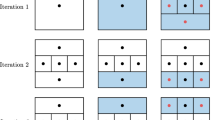Abstract
The importance of incorporating systematic search-domain reduction into random optimization is illustrated. In the absence of domain reduction, even an enormous number of function evaluations does not ensure convergence sufficiently close to the optimum as was recently reported by Sarma. However, when the search domain is reduced systematically after every iteration as recommended by Luus and Jaakola, convergence is obtained in a relatively small number of function evaluations, even when the initial search region is large and the starting point is far from the optimum.
Similar content being viewed by others
References
Sarma, M. S.,On the Convergence of the Baba and Dorea Random Optimization Methods, Journal of Optimization Theory and Applications, Vol. 66, pp. 337–343, 1990.
Luus, R., andJaakola, T. H. I.,Optimization by Direct Search and Systematic Reduction of the Size of Search Region, AIChE Journal, Vol. 19, pp. 760–766, 1973.
Wang, B. C., andLuus, R.,Reliability of Optimization Procedures for Obtaining Global Optimum, AIChE Journal, Vol. 19, pp. 619–625, 1978.
Luus, R., andBrenek, P.,Incorporation of Gradient into Random Search Optimization, Chemical Engineering Technology, Vol. 12, pp. 309–318, 1989.
Author information
Authors and Affiliations
Additional information
Communicated by M. Avriel
Rights and permissions
About this article
Cite this article
Spaans, R., Luus, R. Importance of search-domain reduction in random optimization. J Optim Theory Appl 75, 635–638 (1992). https://doi.org/10.1007/BF00940497
Issue Date:
DOI: https://doi.org/10.1007/BF00940497




